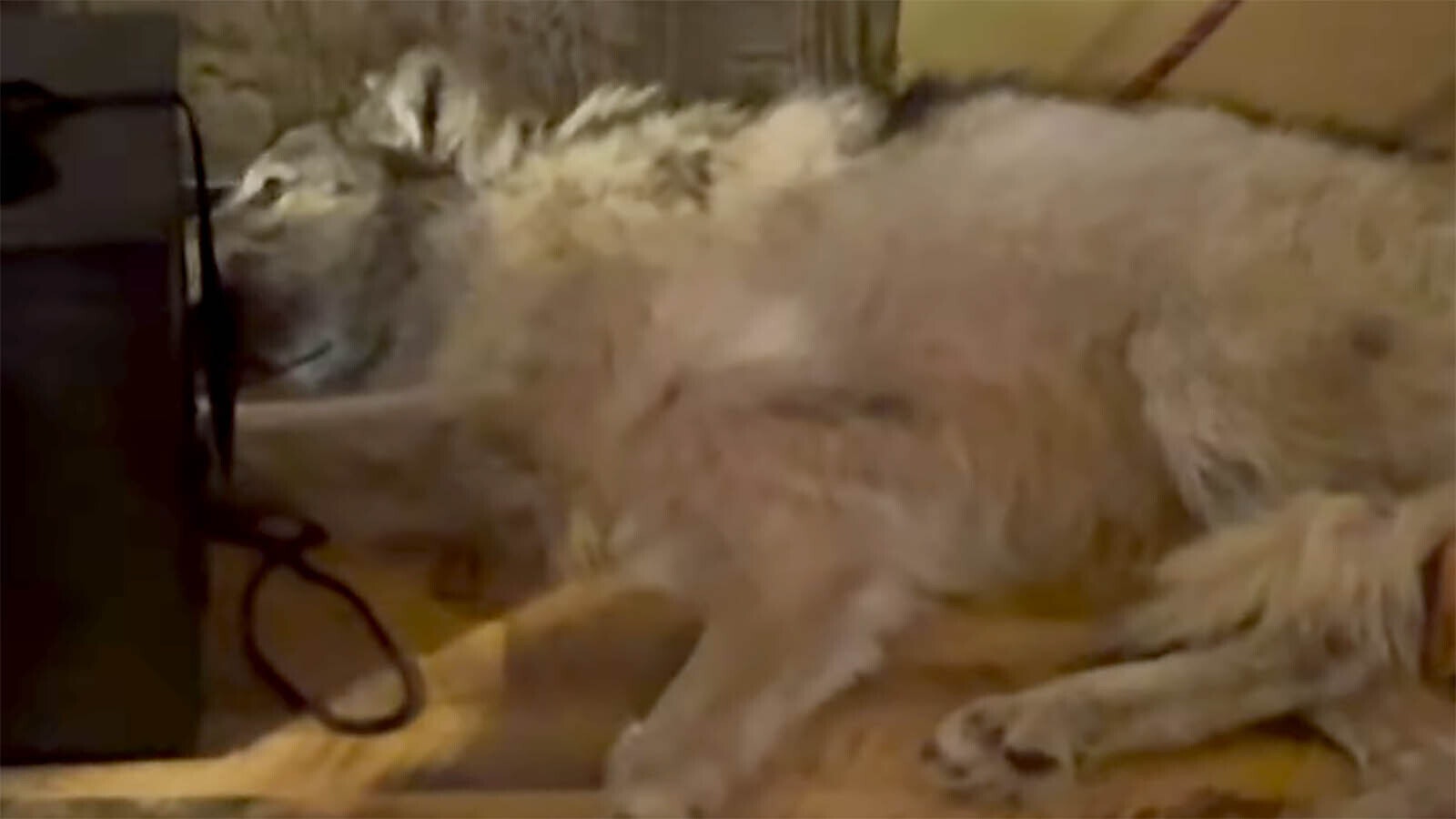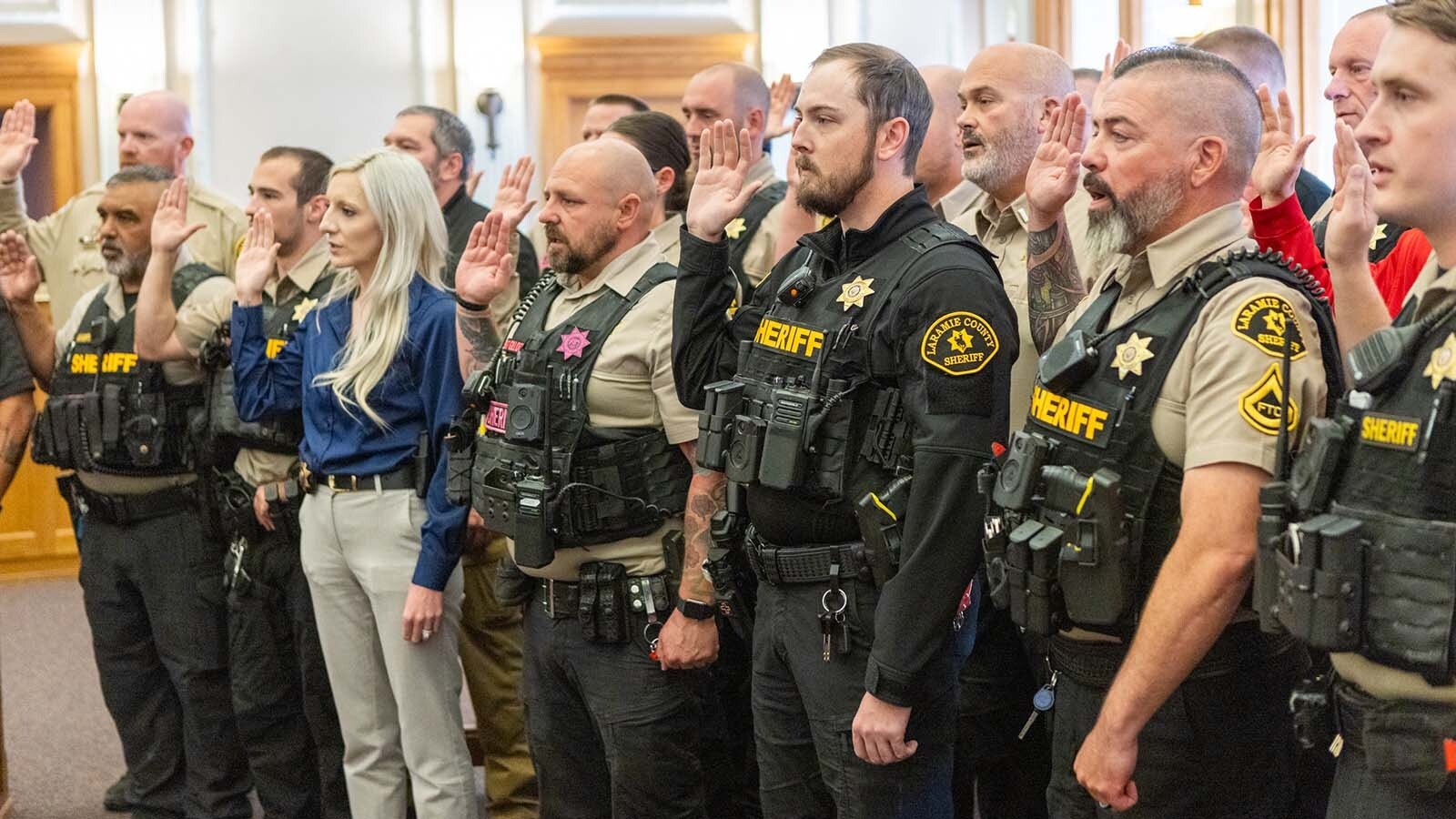Sublette County authorities are calling a grand jury to decide whether to indict Cody Roberts, a Daniel man who ran over a wolf with a snowmobile, brought it muzzled into a bar, then shot it in February 2024.
That’s according to a Wyofile report drawing from anonymous sources familiar with the confidential grand jury impaneling.
Sublette County Attorney Clayton Melinkovich, who is bound by confidentiality law, declined Wednesday to confirm whether he’s asked a judge to impanel a grand jury to weigh the controversial act.
Roberts paid $250 last March toward a citation for violating Wyoming Game and Fish regulations against possessing wildlife.
But he could still be charged under a different law if a grand jury sees fit — and if the newer charge differs enough in its elements from the citation to satisfy a judge that Roberts’ right against double jeopardy isn’t being violated.
The incident with the wolf exploded into international headlines, sparking outrage across the country from sportsmen and animal rights activists, and put both the Wyoming Game and Fish Department and Wyoming’s wildlife management laws under scrutiny.
In its 2025 legislative session, the state passed a law criminalizing cruelty to wildlife.

Because They Can Demand Testimony
Indicting people by grand jury is rare across Wyoming’s state courts, but not unheard-of.
Every day across Wyoming, prosecutors charge people via complaint. That is, they compile probable cause statements from law enforcement personnel into an affidavit, find the charges that fit those statements and file them in the local circuit court.
In the case of felonies, the prosecutor must pit his evidence against a defendant’s cross-examination at a preliminary hearing if he wants to show probable cause and launch the case into the felony-level trial court.
That is, unless the defendant opts to skip his preliminary hearing.
With grand juries, the deliberations that lead to a probable cause finding happen behind closed doors in secrecy, without a defense attorney around to ask contradictory questions.
A handful of attorneys who have managed grand jury proceedings say there are different reasons to go that route.
A key reason among those — and a fair guess of what’s driving Sublette County to call a grand jury — is that grand juries can subpoena witnesses and make them talk, said Rock Springs-based attorney Jason Petri.
The Man Who Shoved His Family Off A Cliff
Petri oversaw grand jury proceedings in 2002 in the case of Bob Duke, who had shoved his wife and child off a cliff in the late 1990s.
Petri’s boss was then-Sweetwater County Attorney Harold Moneyhun, who ran the process alongside Petri and the office’s chief deputy, the attorney recalled.
“Oftentimes, a grand jury is useful because, in a normal criminal case the police might go to talk to witnesses or suspects, relatives, whoever — and you don’t have to talk to the police,” Petri said. “You can just say, ‘I don’t want to talk to you.’”
But the grand jury can compel people to testify before it, can ask questions, and can decide whom to call next.
It’s handy when community members may know something about the case but they don’t want to say what that is, Petri said.
That was the case with Duke’s case, where there’d been murmurs of him plotting his wife and child’s death long before it happened. Community members also talked among themselves about a crime for which Duke had already been convicted federally: plotting to kill his parents for insurance money, Petri recalled.
The grand jury “called in everybody who might know something, put them under oath,” Petri said.
That power isn’t absolute, he noted: People who can articulate some potential self incrimination (or spousal privilege) can assert their Fifth Amendment right to remain silent.
Duke’s grand jury worked on his case for a month.
At the end, the jurors filed a “true bill,” or green light to indict, rather than a “no bill,” which is a statement denying the prosecutor the option to charge someone from their findings.
The things those jurors documented remain confidential today, said Petri.
“In fact, there’s a box full of the grand jury materials in the county attorney storage room,” he said. “It’s still taped up and has a big warning sign that says it’s never to be opened unless you have a court order from the district court or higher.”
Still, word gets out in a small town.
Defense attorneys and others in Green River probably came to their own conclusions when one room in the courthouse was occupied for a month and three prosecutors were missing from daily court hearings, Petri said with a chuckle.
Because Of Nefarious Actors
Former Fremont County Attorney Patrick LeBrun ran a grand jury proceeding in about 2010 while working as deputy for his then-boss Brian Varn, he recalled to Cowboy State Daily.
Another deputy in the office, Kathy Kavanaugh, ran the proceeding alongside him, LeBrun said.
It was a drug conspiracy case with around 30 suspects-turned-defendants.
The prosecutors didn’t choose the grand jury because of its subpoena powers or because of the efficiency that process can bring to cases with numerous defendants, LeBrun said. They chose that charging route because of its secrecy.
Rather than file all 30 cases one by one, in the public and open court, they compiled those cases simultaneously, in secret, so that they didn’t tip off potential co-conspirators before they were ready to charge them all.
“It allows some due process to occur without exposing the case to nefarious individuals who might like to know about it,” said LeBrun.
But under normal circumstances, LeBrun said he has preferred the usual route of charging the case in circuit court and having a public and adversarial hearing to determine probable cause.
The adversarial route gives him a better idea how strong the case is, he said.
Petri noted in his own interview that grand juries' lack of cross-examination by the defense is a criticism many detractors have against their use.
Park County Attorney Bryan Skoric had brought in his own grand jury prior to Fremont County’s, so he visited LeBrun and Kavanaugh to help them learn how to run the proceeding, LeBrun said.
In fact, he added, impaneling grand juries was somewhat a fad in that era.
For Efficiency, For Propriety
Sweetwater County Attorney Dan Erramouspe pursued charges in two grand jury cases in late 2015 and early 2016, he told Cowboy State Daily.
The same panel oversaw both cases since the jurors are available for a year after they’re first called, he said.
One case dealt with a drug trafficking organization and around 35 defendants.
Efficiency was a key reason for having the grand jury oversee that one, said Erramouspe.
Rather than having prosecutors attend potentially 35 preliminary hearings (which range from about 10 minutes to five hours in length), the grand jury compiled enough evidence on all defendants to send their cases to the felony-level court in one batch.
The same set of jurors reviewed evidence in the case of Jacob Anglesey, a former Green River Police Department officer who was ultimately convicted of manslaughter in the death of a 2-year-old boy hurt while in his care.
Having Anglesey’s peers decide whether he was chargeable rather than making the choice himself was about propriety, Erramouspe recalled.
The case was seven years old. A special prosecutor had already gone through the evidence and hadn’t brought charges.
Erramouspe was new to his career as county attorney and wanted to distance himself from any implication that Anglesey’s charging was political, he said.
The grand jury indicted on a first-degree murder variation called felony murder, which was later pled down to voluntary manslaughter.
A judge sentenced Anglesey to between 16 and 20 years in prison — nearly the maximum allowed under the law.
Clair McFarland can be reached at clair@cowboystatedaily.com.





